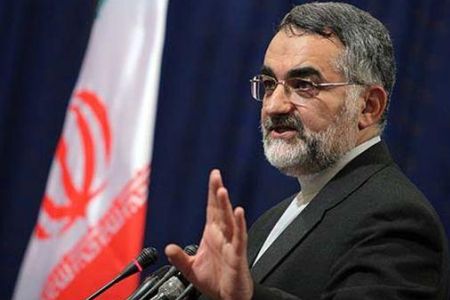
The 11th Iranian presidential elections, scheduled for June 14, are fast approaching, and as election day draws near, many prospective presidential candidates (they must be approved by Supreme Leader Ali Khamenei before they can run) are publicly distancing themselves from the controversial statements made by incumbent president Mahmoud Ahmadinejad over the last eight years. Their statements offer some insight into what we can expect from a post-Ahmadinejad Iran.
Last week, Mohammad-Bagher Ghalibaf, the current mayor of Tehran and former presidential candidate, criticized President Ahmadinejad’s infamous 2009 statement that the Holocaust is “a myth,” claiming that Ahmadinejad’s behavior has only served to delegitimize Iran’s nuclear program and its support for the Palestinian cause in the eyes of the Western nations.
“We were never against Judaism; it’s a religion. What we opposed was Zionism,” Ghalibaf said in an interview with the Iranian Tasnim news agency. “We’ve been the major supporters of Palestine for 30 years, but with the wisdom of ayatollahs Khomeini and Khamenei, no one could accuse us of being anti-Semitic. Suddenly, however, without consideration for the results and implications, the issue of the Holocaust was raised. How did this benefit the revolution or the Palestinians?”
“It became an excuse for our biggest enemies, the Zionists, and affected the goals of the Palestinians,” Ghalibaf continued. “Defending the goals of the Palestinians is part of the principles of our foreign policy. Denying the Holocaust is not part of our foreign policy.”
Gholam Ali Haddad-Adel — former speaker of the Majlis, the national legislative body of Iran, and prospective 2013 presidential candidate — also criticized Ahmadinejad’s unnecessarily provocative statements.

“There was no need for these statements,” Hadad-Adel said. “I did not support denial of the Holocaust in the way Ahmadinejad did. We have not have benefited by the denial of the Holocaust.”
Furthermore, last month, Alaeddin Boroujerdi — chairman of the Committee for Foreign Policy and National Security of the Islamic Consultative Assembly — publicly attacked Ahmadinejad for denying the Holocaust.
“We paid for it without having gained anything,” Boroujerdi said. “Why must the Security Council admonish us? Why must all European countries condemn us? What need was there for that?”
“I think this was a mistake […] the policy both at the time of Imam Khomeini and the Supreme Leader has been to maintain good relations with all countries,” Boroujerdi said. But he added, “The United States is an exception to the rule because we do not have relations with them and they are hostile toward us. Of course the Zionist regime is another story since we even do not recognize it as a country.”
If we take them at their word, the statements of these presidential hopefuls imply that not only is there no consensus in Iran as to the fallacy of the Holocaust, but Ahmadinejad’s Holocaust denial actually places him in the minority.
Since the beginning of Ahmadinejad’s presidency, Iran-watchers have argued that having a noticeably radical individual in Iran’s highest elected office is actually “good for the Jews,” and by extension, good for the United States. An Iranian president who wears his radical animosity on his sleeve and openly denies the Holocaust is, these Iran-watchers point out, preferable to one who is successful at making his anti-Western, anti-Israel machinations palatable to the international community.
Therefore, perhaps the moderation of these presidential hopefuls is cause for greater alarm within the pro-Israel community.
On the other hand, the statements of these potential candidates add nuance to the standoff between Iran and Israel. These prospective presidential candidates distinguish between Jewry and the State of Israel. Jews and Judaism, these politicians claim, are not and have never been a problem for Iran. These politicians simply dispute the legitimacy of a state that was born out of Palestinian tragedy — an acceptable point of view in every country in the world, including Israel. In essence, they are distinguishing between anti-Semitism and anti-Zionism, and they are making this distinction at the expense of their current president.

Furthermore, the statements of these men reflect the dire wish of most Iranians to be replaced into the good graces of the international community. They affirm that the damage of economic sanctions has not been worth the benefit of a nuclear program — one that was doomed from the outset by a president who did nothing to instill any confidence in the international community that the program would be put toward productive use. This might be an invitation to the international community to start the post-Ahmadinejad era on the right foot — without sanctions. With this gesture of good faith, the international community could capitalize on the expressed wish of Iran’s top presidential hopefuls. (And if that fails, sanctions can always be replaced.)
If one of the three aforementioned politicians ends up winning the Supreme Leader’s approval and going on to win the presidency, then the nature of Iran-US and Iran-Israel tensions will change drastically. Iran’s next president is sure to do a better job of explaining the purpose of Iran’s nuclear project and of assuring the world that Iran is not a rogue state bent on regional domination, and of making the wise choice to root that assurance in reality.
The next president will also be clearer about Iran’s policy toward Israel — one that is based not on hatred of Jews but on sympathy for the dispossessed Palestinian nation. Thus, the discourse surrounding Iran-Israel tensions will cease to revolve around the personality of Ahmadinejad and start to address the real issues that matter to the Iranian government: the plight of the Palestinians, Israel’s nuclear arsenal, and American meddling in Middle East affairs. These issues are all up for dispute, and thus, the hostility between the two blocs will not evaporate overnight. But at the very least, the conversation will not end the moment someone cries anti-Semitism.

